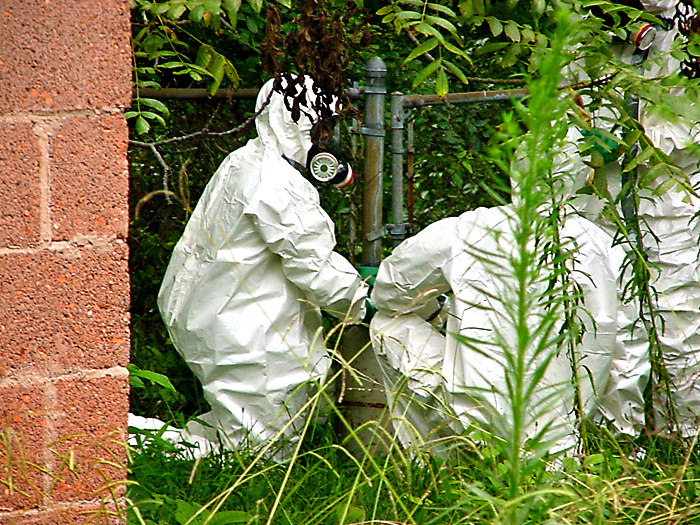A battle is brewing in the Tennessee statehouse, driven by a meth epidemic that costs the state more than $1 billion annually.
Lawmakers will debate whether pseudoephedrine, a popular and effective cold remedy, should be restricted more heavily because of its role in the illegal methamphetamine trade. One proposal would make drugs like Claritin-D, Sudafed and Aleve-D available only if a doctor writes a prescription.
One thing is clear: Police can't handle the meth epidemic alone.
"There isn't enough law enforcement to stop the amount of meth manufactured (domestically)," said David Hamby, Southeast regional coordinator for the national High Intensity Drug Trafficking Areas program.
Tennessee spends roughly $1.6 billion annually, according to a 2009 Rand Corp. study, to fight what is regarded as one of the nation's worst meth problems.
The state had some success in shutting down meth labs in 2005 when electronic tracking of over-the-counter sales of cold medicine containing pseudoephedrine -- a key ingredient in the cooking of methamphetamine -- first was instituted statewide.
But two years later, the problem was on the rise again as criminals figured out ways around the tracking system. And 2010 marked Tennessee's worst year on record in numbers of meth labs seized -- 2,082 -- higher than every other state but Missouri.
RELATED DOCUMENTLink: HB 181 would require consumers to get a prescription to buy cold medicine with pseudoephedrine.
Now a group that represents the manufacturers of cold medicine wants lawmakers in both Tennessee and Georgia to sign on to a new electronic tracking system -- the National Precursor Log Exchange -- that they say is better than what's now in place.
Legislatures in nearly a dozen states already have signed on to use the system.
The new system is different from the current one because all pharmacies in the state would be required to use the database, which is not the case now, said Mandy Hagan, spokeswoman for the Consumer Healthcare Products Association, the group spearheading the lobbying effort on behalf of cold remedy manufacturers.
A bill for the new system hasn't been introduced in Tennessee or Georgia. But legislation that would require a prescription to buy cold medicine containing pseudoephedrine was filed last week in Nashville.
Early evidence indicates that the prescription-only measure can help, according to police and lawmakers backing the bill.
In Mississippi, police said the number of meth labs seized has fallen 70 percent since July 1, when over-the-counter sales of pseudoephedrine were stopped.
Now, at least two states besides Tennessee -- Kentucky and Missouri -- are considering a prescription-only mandate.
Still, requiring a prescription for the popular and effective treatment for colds and sinus problems could pose obstacles for consumers as well as physicians. In Tennessee, an estimated 1.5 million boxes of cold medicine that contain pseudoephedrine were sold last year, and sales nationally totaled more than $500 million.
Cold remedy manufacturers are willing to pay for the new electronic tracking system because prescription-only laws could cost them millions in lost sales.
"If we don't provide electronic trafficking as a solution, then a lot of lawmakers will see no alternative other than to require prescriptions," said Hagan.
That sets up a potential battle in the state Legislature this session.
METH WARS
Tennessee was one of the first states to take legislative steps to curb meth labs, experts said.
Former Gov. Phil Bredesen created the Tennessee Meth Task Force in 2004, then state legislators approved the Meth Free Tennessee Act of 2005.
Chief among the new enforcement tools under the act was an expanded Meth Task Force database that included electronic tracking and the capacity to alert pharmacies when someone was buying more than the three-box-a-month legal limit, said task force Director Tommy Farmer.
Over time, the tracking system allowed police to monitor illegal sales and gave pharmacies the option of stopping the sale at the time of purchase, Farmer said.
At the time, tracking cold medicine sales was thought to be key to curbing meth labs.
"We didn't know what the best way to deal with meth was," he said. "So we had to go and try."
But the tracking and federally required monthly limits led to a new kind of criminal -- smurfers -- go-betweens who help meth manufacturers get around both measures. Smurfers will go from store to store, buying boxes of cold medicine with pseudoephedrine at a cost of $7 to $8, then turn around and sell it to meth cooks for $40 to $50 a box, police say.
To catch smurfers, investigators will comb pharmacies to find the suspicious purchasers, then try to talk them into taking police to the meth cooks, said Steve Lawson, director of the 10th Judicial Drug Task Force, which serves Bradley, McMinn, Polk and Monroe counties.
But meth no longer is primarily a problem in rural counties, said Hamilton County Sheriff's Lt. Van Hinton. The sheriff's office doesn't have the manpower to keep up with the number of meth labs popping up, he said.
In 2010, 104 meth labs were seized in Hamilton County -- an average of one every three to four days.
"It's everywhere," Hinton said.
When sheriff's deputies found a meth lab on 19th Street in downtown Chattanooga, they found evidence indicating that it was used by at least 100 cooks.
CONTINUE READING Meth creates heavy financial burden for states
Police say smurfers are getting smarter and finding alternatives to outsmart the current tracking system. They use fake IDs and recruit family members to help buy the cold medicine, so their name don't keep showing up in the tracking system.
And in Georgia, the problem is worse.
The Peach State lacks a comprehensive tracking system and does not require pseudoephedrine products to be sold only in pharmacies. Those products can also be sold at gas stations and convenience stores. Laws to create a tracking system have been introduced in the Legislature several times, but never approved.
Hamby, of the High Intensity Drug Trafficking Areas program, described Georgia's lack of controls as a "black hole."
Investigators must sift through stacks of paper reports -- taken from the pharmacies -- to spot smurfers, a time-consuming exercise that makes it almost impossible to actually stop meth production, said Patrick Doyle, deputy commander of the Lookout Mountain Judicial Task Force.
"There's labs that have been out here for years that we've haven't been able to get," Doyle said.
PRESCRIPTION VS. E-TRACKING
To curb meth labs in the states, police favor following the example of states such as Mississippi and Oregon by stopping over-the-counter sale of pseudoephedrine products entirely.
In Tennessee, House Bill 181, filed last week, would make it illegal for pharmacies to sell these products without a prescription, said Rep. David Hawk, R-Greeneville, who is backing the bill.
"The bottom line is we need to stop the production of illegal drugs in Tennessee," he said. "This is one way to get there."
Sen. Andy Berke, D-Chattanooga, said he would support a prescription-only bill.
"We have to look at our policies and how we categorize pseudoephedrine sales," he said.
But other lawmakers question the proposed law, contending that consumers shouldn't have to suffer for the criminals' actions.
"Why should we punish the 99 to try and stop the one?" said Rep. Glen Casada, R-Franklin.
Franklin, who is chairman of the Health and Human Resources Committee, said he would support legislation that the Consumer Healthcare Products Association is backing for the new tracking system because the proposal takes the middle ground when dealing with meth.
Legislatures in 10 states have voted to participate in the new tracking system being paid for by manufacturers, and it's already being used in four states -- Kentucky, Iowa, Louisiana and Illinois.
The database is free to the state, and the cold medicine manufacturers will pay for maintaining the system and its records, about $500,000 up front. But Hagan couldn't give an exact amount of the overall costs.
Law enforcement will use a password to access the database, making it available statewide.
Although the system has only been used in the four states for three years or less, Hagan insisted that it is already making a difference.
"We block on average 40,000 grams of pseudoephedrine [a month] in the four states where databases are up and running," said Hagan.
The database allows multiple states to be on the same system and share instant information, so smurfers could no longer cross state lines to purchase pseudoephedrine.
But in Kentucky, which has had the system statewide since 2007, some police say it doesn't work. In fact, legislators there are proposing a prescription-only bill this year.
"We thought this [system] was going to reduce our meth problems," said Sgt. Stanley Salyards, with the Louisville Metro Police Narcotics division. "[But] a year later, our meth labs were off the charts."
Kentucky's meth lab seizures increased from 741 in 2009 to roughly 1,011 labs in 2010, Salyards said. Smurfers outsmart the database with fake IDs and other methods.
But lawmakers and organizations in support of electronic tracking say the increase in meth labs doesn't mean the system isn't working. They argue that the system could simply be leading police to more meth labs.
"Just because you arrest more doesn't mean it's not working," Casada said. "It means you're identifying and capturing those drug dealers."
Stopping over-the-counter pseudoephedrine sales won't wipe out meth, but it would severely restrict access to the ingredient that makes cooking meth so simple virtually anyone can do it.
"If you can follow the Toll House chocolate chip cookie recipe, you can make meth with pseudoephedrine," said Marshall Fisher, director of the Mississippi Bureau of Narcotics.
Police say the best success stories come from prescription-only states Mississippi and Oregon.
After Mississippi's law took effect, the state promptly saw its number of meth lab seizures decline. Between August 2009 and January 2010, officials recorded 388 lab seizures, but that number fell to 109 labs during the same timeframe a year later.
And the prescription-only law is "the only thing that we've done differently," Fisher said.
Mississippi's experience has the National District Attorneys Association discussing the possibility of openly supporting prescription-only laws in either its March or July meeting, said the association's executive director, Scott Burns.
"Prosecutors nationwide are considering a resolution in support of [restricting] pseudoephedrine," Burns said.
CONSUMER ANGLE
But pharmacists have differing opinions on the prescription-only option.
If pseudoephedrine was a controlled substance, pharmacists wouldn't have to worry about selling the product to criminals and would be free to only fill prescriptions for legitimate users, said Brad Standefer, a pharmacist at Access Family Pharmacy on Hixson Pike.
Restricting cold medicine with pseudoephedrine "would send a clear message that we are concerned about the well-being of our community," he said.
Currently, it's a hassle to copy all the seller's information -- name, address, driver's license number -- then log onto the Internet when someone purchases a box of cold medicine, Standefer said. The alternative cold medicines without pseudoephedrine work just as well for most cold patients, he said.
But other pharmacists disagree, arguing that those who suffer from sinus trouble shouldn't have to take extra steps -- and the added cost of a doctor's visit -- because of criminals.
Restricting cold medicine "would hinder an effective medication for people with a cold," said Daniel Platt, a pharmacy manager at Bi-Lo on Ringgold Road. "Doctors don't need to be bombarded with congestion."
Contact Joy Lukachick at jlukachick@timesfreepress.com or 423-757-6659.


